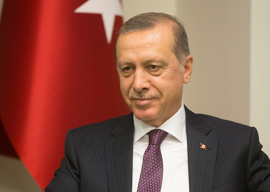
March 14, 2017

Recep Tayyip Erdogan
Source: Bigstock
At the end of 2017, neither Wilders nor Le Pen is likely to be in power, but the forces driving their candidacies are growing stronger.
Foremost among these is the gnawing ethnonational fear across Europe that the migration from the South—Maghreb, the Middle East and the sub-Sahara—is unstoppable and will eventually swamp the countries, cultures and civilization of Europe and the West.
The ugly and brutal diplomatic confrontation with Turkey may make things worse, as the Turks, after generous payments from Germany, have kept Syrian civil war refugees from crossing its borders into Europe. Should Ankara open the gates, a new immigration crisis could engulf Europe this spring and summer.
Other ethnonational crises are brewing in a familiar place, the Balkans, among the successor states born of the 1990s breakup of Yugoslavia.
In Bosnia, secessionists seek to pull the Serb Republic away from Sarajevo toward Belgrade. The Albanian minority in Macedonia is denouncing political discrimination. The Serbs left behind after Kosovo broke loose in 1999, thanks to 78 days of U.S. bombing of Serbia, have never been reconciled to their fate.
Montenegro has charged Russia with backing an attempted coup late last year to prevent the tiny nation from joining NATO.
The Financial Times sees Vladimir Putin’s hand in what is going on in the Western Balkans, where World War I was ignited with the June 1914 assassination of the Austrian archduke in Sarajevo.
The upshot of all this:
Turkey, a powerful and reliable ally of the U.S. through the Cold War, appears to be coming unmoored from Europe and the West, and is becoming increasingly sectarian, autocratic and nationalistic.
While anti-immigrant and anti-EU parties across Europe may not take power anywhere in 2017, theirs is now a permanent and growing presence, leeching away support from centrist parties left and right.
With Russia’s deepening ties to populist and nationalist parties across Europe, from Paris to Istanbul, Vlad is back in the game.